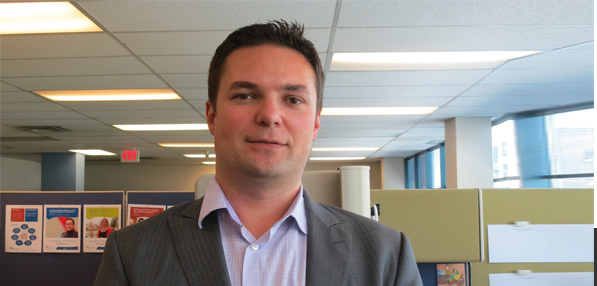New single sign-on system is a big timesaver
Healthcare professionals will have more time to spend focusing on patients instead of waiting on technology following the implementation of single sign-on technology. This will be one of many benefits in line with the Clinical & Systems Transformation (CST) project.
Using single sign-on technology, our healthcare professionals will only be required to log in to their computer system once a day. From there users will simply tap an identification card against a reader to log in to any computer across the facility, with no need to re-enter passwords or spend time waiting to log in and/or reopen applications.
“Currently staff members who provide patient care must remember multiple passwords and log in and out each time they want access to their systems,” says Serge Music, CST Technical Transformation Project Manager.
“This overabundance of passwords and log ins can lead to lost productivity and delays in patient treatment.”
According to Serge, single sign-on technology presents major benefits in the healthcare environment where staff members regularly move around and often need to share workstations.
“Take a scenario where a nurse needs to walk away from a workstation to assist a patient. With single sign-on, someone else can easily tap on and off the computer while the nurse is away, and when the nurse comes back, they can pick up exactly where they left off just by tapping their card.”
Kelle Payne, CST Executive Director and Transformation Lead, welcomes the new technology.
“Single sign-on technology means that not only will frontline healthcare staff will have easy access to information, they’ll also have more time to focus on their patients. This will ultimately enhance the delivery of care to the patient while increasing staff satisfaction.”
To protect patient data by ensuring computers aren’t left open and unattended, the system will be programmed to automatically log users off after a period of inactivity (the exact length of time is still under investigation). Single sign-on also eliminates the need for passwords to be shared or written down on post-it notes, increasing the overall system security.
While the devices required to implement single sign-on have been selected, the next major challenge lies in integrating the technology into existing environments. Testing of the new system is currently being conducted by the CST Infrastructure team.
A working demonstration of the single sign on technology is set to be available for mid-September 2014. For more information, please contact Serge Music, CST Technical Transformation Project Manager, on serge.music@phsa.ca
The Benefits of Single Sign On at a Glance
• Fewer username and password combinations to remember
• Less time wasted waiting for log-in processes
• Reduced ‘clicks’ and keyboard strokes required to access applications
• Improved efficiency and productivity
• Increased security of healthcare information
• Less time calling IT regarding lost or forgotten passwords
Background information
• Clinical & Systems Transformation (CST) is a joint initiative of VCH, PHSA and PHC, and one of the largest and most complex healthcare projects in Canada. It spans across several areas of the continuum of care including: acute care inpatient and outpatient units, ambulatory care and residential care. As well as creating consistent, leading practices, and a shared clinical information system, CST will deliver HIMSS Level 5 functionality .
• Clinical design teams, made up of hundreds of highly-skilled, multi-disciplinary professionals from across the three Health Organizations and Team IBM (experts from IBM Technical Services, Deloitte, Leidos Solution Builders, and the University of Pittsburgh Medical Centre), started work on April 7, 2014. These teams are tasked with designing our future workflows, based on leading practices. In doing so they are defining the requirements for our new clinical information system.
More info
Visit CSTproject.ca for more information and regular updates, and to submit suggestions for future articles. If you have questions or feedback, please email info@CSTproject.ca or contact Kelle Payne, Executive Director, Transformation Lead (joint) at Kelle.Payne@vch.ca and Donna Stanton, Executive Director, Transformation Lead (joint) at Donna.Stanton@vch.ca


Rosemary Carnahan
I hope it is not only the hospital-based clinicians who will benefit from this technology. It is also very relevant for all community-based programs.
We currently have huge issues with point of care access to documentation- air cards that do not work well,servers that dump clinicans out of the system frequently,long log-in times, multiple programs ( Pixalere,Procura,PARIS,Care Connect)each with different log-ons.
Gary Ferdinands
Do you see bio-recognition log-ons coming down the pipe?
Would reduce risk of stolen or “loaned” id log-on cards, no?